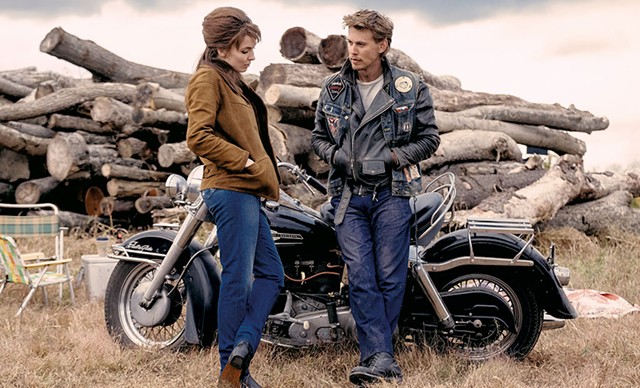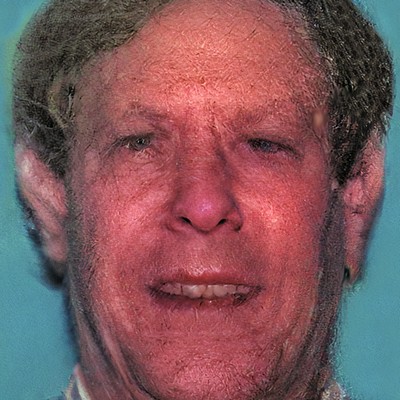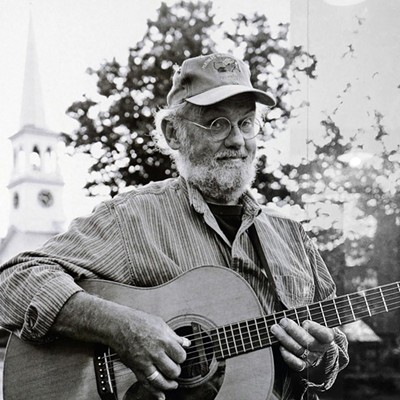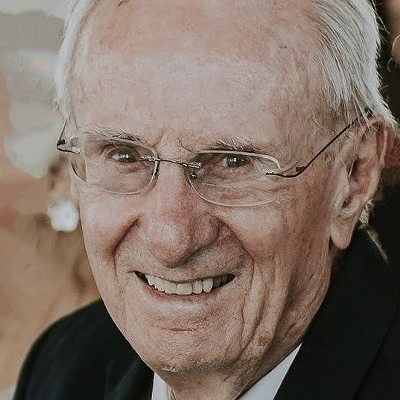
- Courtesy Of Kyle Kaplan/Focus Features
- Jodie Comer and Austin Butler play a biker couple in this immersive period piece based on a photo book.
It's been a while since we heard from director Jeff Nichols. Honored with festival and Independent Spirit Awards, the Arkansas-born filmmaker brought a keen sense of rural places and people to Loving, Mud, Midnight Special and Take Shelter. Now he returns with The Bikeriders, a period drama based on the 1968 photo book of the same name by Danny Lyon, a journalist who belonged to the Chicago Outlaws Motorcycle Club and chronicled the lives of its members.
The deal
Lyon (Mike Faist) interviews a woman named Kathy (Jodie Comer) about how she fell in love with biker Benny (Austin Butler) and became involved with his motorcycle club, the Chicago Vandals. The film alternates between scenes of the Vandals' mid-1960s heyday — when Lyon joined them at rowdy campouts — and the older Kathy's wry reminiscences in the early '70s.
A veteran of failed marriages, Kathy has instant chemistry with Benny, though she laments that he's a doer rather than a thinker, riding recklessly enough to land himself frequently in the hospital or the slammer. More prone to reflection is the club's president, Johnny (Tom Hardy), a trucker and family man who founded the Vandals as a community for outcasts. As the club's profile rises in the late '60s, and bikers become en vogue, Johnny contends with a new tide of drugs and violence that threatens to tear the close-knit group apart.
Will you like it?
The trailer for The Bikeriders might lead you to expect a traditional hero's journey set in the biker world, with Butler's character as the protagonist coming into his own. In fact, it's nothing of the kind. Benny remains a distant, unknowable character — or perhaps just such a simple one that there's little to know. He's pretty, he's loyal to a fault, he likes to fight, and he doesn't cry.
As an icon of cool, Benny is less subject than object: the bone of contention between the film's two actual protagonists. Johnny wants to groom him into the next leader of the Vandals, while Kathy begs him to settle down and be a normal husband. Benny resists the pressure from both sides, and the resulting tension becomes the central conflict in this sprawling, anecdotal epic.
Rather than glorify the biker lifestyle, Nichols takes an anthropological approach reminiscent of the depiction of the mob in Martin Scorsese's Goodfellas. With its text drawn entirely from audio recordings, Lyon's book has elements of oral history. Kathy's narration shapes the film's story, too, and Comer gives her a strong personality as well as a pungent Chicago accent.
A salt-of-the-earth, seen-it-all woman with an acerbic sense of humor, Kathy has no interest in gilding the legend of the Vandals. We see their highs — the freedom of the open road, fellowship, good-natured brawls — but also their lows, including senseless accidental deaths. Kathy can't resist Benny's pure animal allure, yet she sees nothing noble in his appetite for self-destruction, declaring that "it would be funny if it weren't so tragic."
While Nichols' screenplay doesn't dig as deep into the psychology of this "biker chick" as it could have, Kathy is good company — you might start imagining her narrating the vehicular antics of a Mad Max movie in that nasal drawl. She's surrounded by an amusing gallery of misfits, from Johnny's good-natured lieutenant (Damon Herriman) to bug-eating Cockroach (Emory Cohen) to the Joe Pesci grotesque of the bunch: Zipco. Played by Michael Shannon, this unhinged would-be working-class hero gleefully applies the term "pinko" to anyone who makes him feel insecure, including the college boy photographer. Even Norman Reedus of "The Walking Dead" turns up, playing a ringer for Peter Fonda in Easy Rider.
What drives this bunch of restless blue-collar white men? Nichols doesn't delve too far into that question. But The Bikeriders does explore how an innocent desire to bond gradually gives way to more violent tendencies as the club swells to accept outsiders, including Vietnam War vets who bring their own demons. Generational tensions play a role in this transformation, too; a subplot involving a young Vandal wannabe (Toby Wallace) unfolds with graceful Shakespearean inevitability.
From first frame to last, The Bikeriders is deeply grounded in time and place. The brick stoop of Kathy's modest house feels like a character in its own right; when the cops pursue Benny out of the city, he escapes through cornfields. Without using needle drops as short cuts, Nichols makes these lost settings real to us. In a 2023 interview with A Rabbit's Foot, Lyon said, "Open one of my books, and you are back in another world, fixed with ink on paper, forever." Despite its obvious fictional additions, the movie transports us in the same way.
margot harrison
If you like this, try...
Goodfellas (1990; Apple TV, rentable): Nichols' film takes a page from Scorsese's gangster epic, in which Henry Hill (Ray Liotta) narrates his rise and fall in the heyday of the mob. Just imagine the story as told by Lorraine Bracco's character instead.
The Wild One (1953; Philo, Sling TV, rentable): In The Bikeriders, Johnny is inspired to form the Vandals after seeing this movie in which the young Marlon Brando plays a disaffected biker named Johnny. Asked what he's rebelling against, he famously replies, "Whaddya got?"
Take Shelter (2011; Hulu, rentable): Nichols explored mental illness and climate-related anxieties in this drama, starring Shannon and Jessica Chastain. A recent episode of the podcast "This Had Oscar Buzz" explores the debates the movie still provokes.





Comments
Comments are closed.
From 2014-2020, Seven Days allowed readers to comment on all stories posted on our website. While we've appreciated the suggestions and insights, right now Seven Days is prioritizing our core mission — producing high-quality, responsible local journalism — over moderating online debates between readers.
To criticize, correct or praise our reporting, please send us a letter to the editor or send us a tip. We’ll check it out and report the results.
Online comments may return when we have better tech tools for managing them. Thanks for reading.